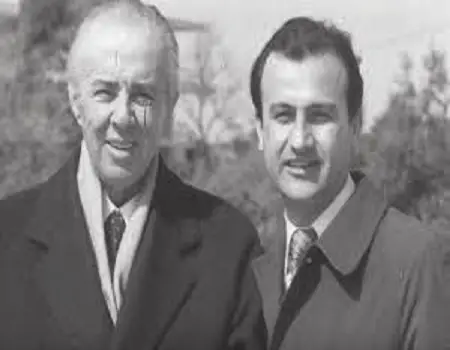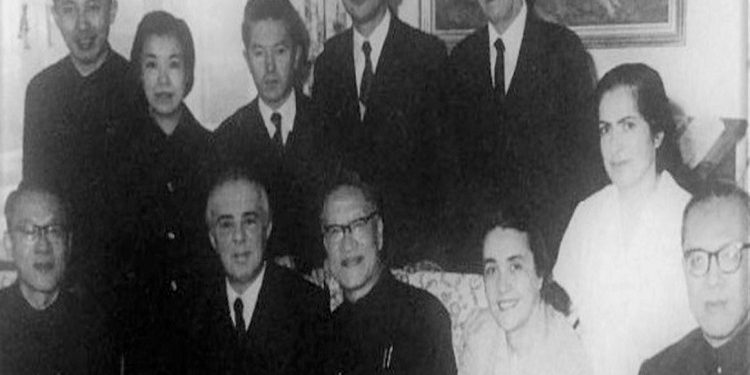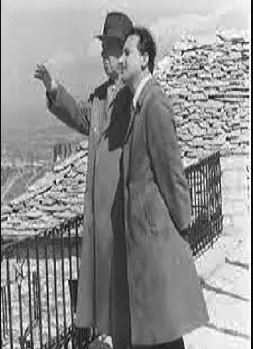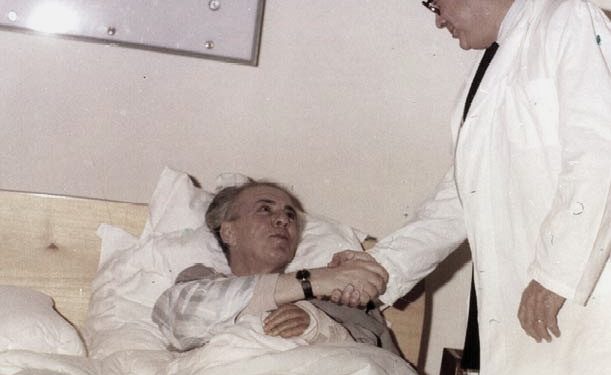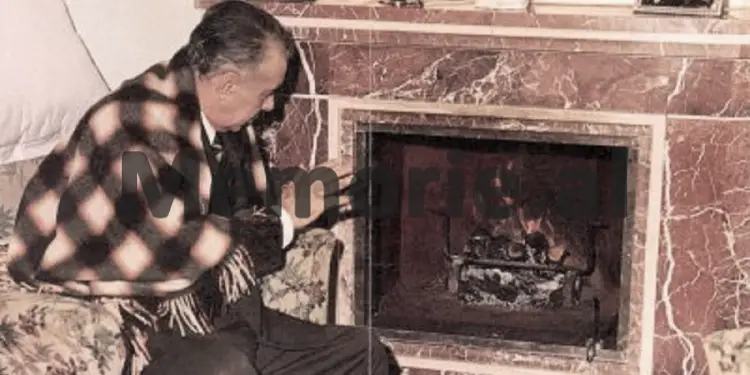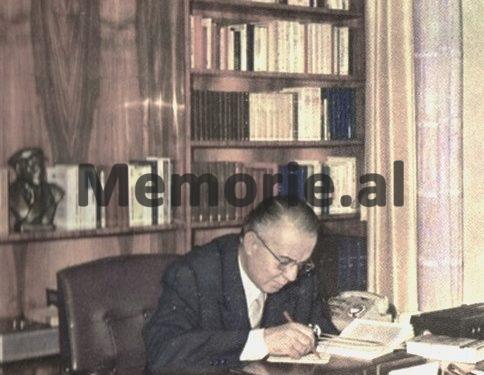The Medical File of Enver Hoxha and the Communist Leadership
Memorie.al / Enver Hoxha’s medical file most likely remained with his family after his death in 1985. Prof. Dr. Isuf Kalo, the former personal doctor of the dictator Enver Hoxha, explains how the health of communist leaders was monitored before the ’90s, and particularly that of the number one man in the state. Dr. Kalo recounts that senior state officials were treated at a special clinic, where their relevant documentation was also kept. However, for Enver Hoxha, a mini-infirmary was set up and improvised within his own home. An elite team of the best Albanian doctors was assigned to serve Enver Hoxha, while consultations were also held with foreign doctors, both Chinese and French.
Precisely in the infirmary created in the dictator’s villa, his medical file was kept, which only came out of the safe during consultations. Kalo describes how these consultations were conducted, how notes were taken, and how Enver Hoxha’s diagnosis was treated as a very high-level secret.
This was a request of Enver Hoxha himself, and Sulo Gradeci was the one who ensured that this secret was maintained. Kalo says that until the change of systems, the health documentation of Enver Hoxha and his family members was located inside his home, but he cannot say what happened to them afterward.
Prof. Kalo, you were Enver Hoxha’s personal doctor, how was the health not only of him but of the entire leadership treated?
For the entire leadership, which included members of the Political Bureau, government members, members of the Presidium of the People’s Assembly, the Democratic Front, and members and candidates of the Party’s Central Committee, there was a special clinic, called the “Special Clinic” or “the small clinic,” which was modeled after the Kremlin’s for Soviet leaders. This clinic was under the Ministry of Health, and its staff was paid like all other doctors.
What services did this clinic offer besides visits?
It was where their examinations were done; it had a biochemical laboratory, an electrocardiogram machine, and radiography. That clinic also had an annex with 2-3 beds for hospitalization, when a leader needed to be admitted. It also had an operating room, a dental office, and a pharmacy. This was the clinic’s architecture.
Were the relevant documents, the files for each person, kept in this clinic?
These people were monitored and had a special file in this clinic, along with the family members who lived with them, which meant that when someone got married and left the family, their file would theoretically be removed, but this did not always happen. Their files were kept there.
When were you engaged as a doctor for the leadership?
I started working there as soon as I finished medical school. I was 22 years old and was at the disposal of this entire contingent. Later, in 1971, a somewhat more special treatment began for the main trio-Enver, Mehmet, and Hysniu-who were also assigned a personal doctor, but only theoretically, as you would practically be everyone’s doctor.
However, there was a more specific focus on them. I followed them and the family members living with them. Their files were in that clinic, locked in a safe, and were used whenever they came for a visit, with notes added by the doctors.
When were you appointed as Enver Hoxha’s personal doctor?
In 1973, I was appointed Enver Hoxha’s personal doctor. Soon after I went there, he suffered a myocardial infarction. This created the need for a closer health monitoring. At that time, his file was in the “Special Clinic” like everyone else’s, but since daily monitoring was required to get through the acute situation and also for further problems that appeared, that file was taken home, where an infirmary room was opened. The file was kept precisely in this infirmary.
Who had access to it?
It was taken out whenever notes were made, whenever I had consultations, or later by a medical team that was created to be near him. The team kept separate notes during the discussions that came up, but the main file always stayed inside Enver’s house, and as far as I know, Nexhmije’s file as well. But, naturally, I believe the children’s too. The file was a secret. The diagnoses of Enver Hoxha and all the leaders were kept secret.
It was considered a very important secret, even among themselves. It also contained the electrocardiograms, X-rays, his examinations, everything related to their health. Everything is written in the file, or as I said, in a special notebook kept by the medical team. A protocol, during the discussions and proposals that were made.
So, Enver Hoxha’s medical file is in the hands of his family members?
When the system changes happened, the file was at home. I can’t say if it remained with the family or is in the archive. Enver, later, after the problems with Mehmet Shehu arose, was interested in knowing where his documentation was and didn’t want the director of the “Special Clinic” or the Minister of Health to have access to it.
So in a way, it was always kept secret and was there. I don’t know what happened later with the documentation in question, the file, the operations, and the treatment plan. There was also a nurse who kept notes on the treatment.
The work was closed, but an autopsy was done on Enver, and the result was very coherent with our diagnosis. And the clinical condition and cause of death were noted in detail in the medical report that we as a medical team released on the day of death and which was published in the newspaper “Zëri i Popullit.”
Who performed the autopsy?
Our entire team assisted in the autopsy. The best anatomopathologist we had, Prof. Pëllumb Bitri, performed the autopsy. We followed the autopsy with great interest. I appreciated that Nexhmije as a family member allowed this, because performing an autopsy is at the discretion of the family. She was open-minded and transparent. All the diagnoses were attached to the autopsy result.
Even though during his life there was no public transparency about Enver’s health condition, as it was forbidden, when he died, the transparency was complete. The report was made known to the population. Keeping the health status secret was a disadvantage for us, because people were not prepared and believed that “Enver Hoxha will live as long as the mountains.”
You said that in addition to the notes in the file, notes were also kept separately. What happened to this material you wrote?
This material was also handed over there. Enver Hoxha was physically guarded by a large group of guards, led by Sulo Gradeci. The latter had the duty to ensure secrecy as well. We were not allowed to keep notes or diaries about Enver Hoxha, as it was considered a secret, but in our medical team, we established the practice of a protocol, which one of the doctors kept.
Notes were kept there on what each of us said about a certain situation and the position that should be taken. And many times there were several solutions, but each had an advantage and a disadvantage, and we had to reach a consensus that every medication we added was approved by everyone.
This made my work as his personal doctor more difficult, but it also calmed me down, because subjectivity was avoided. It wasn’t just one notebook. Events happened very quickly, and I didn’t learn anything further. When the changes occurred, I was abroad. After Enver’s death, I had transitioned to being a lecturer at the Faculty of Medicine.
I was with the students when the student movement started, and at that time the Hoxha family severed their relationship with me as a doctor. There was a nurse there, Drita Domi, who had the files, but I don’t know who took the notebooks with handwritten notes. We did not make any recordings with a dictaphone, because this was forbidden.
Were your consultations monitored?
During our discussions, it often happened that Sulo Gradeci also came, which I didn’t consider normal, because regardless of his duty, he was a military man and could not always understand the proposals or objections that were made, the medical arguments. This created a kind of tension, as you felt watched by people from the Security service, at a time when we should have been focused on the medical side.
Was there a fear that he might give political overtones to your debates?
If you proposed a medication and someone said that it causes this side effect or complication, he could interpret it as a risk. But medicine is about risk management; you will risk something to gain something more. It is known that every medication has a side effect, but these are not always predictable, as long as the intention is good.
But out of “fear” that someone might interpret this intentionally, you immediately enter a psychology of self-preservation. Despite Sulo’s not-so-bad intentions, I had discussed this with Ylli Popa and even Fejzi Hoxha, who was the main one, as it created a kind of complex. But this risks you not doing the best possible.
Who were the doctors that made up the team that monitored Enver Hoxha’s health?
Initially, the team was smaller: Fejzi Hoxha, Ylli Popa, Nikolla Çobani, Petrit Gaçe. Later, Ahmet Kamberi, Sabit Brokaj, and Hajro Shyti were added. It was an on-call team. He had a doctor who monitored him 24 hours a day, especially a cardiologist, who also accompanied him to his office.
I had the pleasure of having his permission to move and continue my professional contacts at the hospital without being stuck, but for this, someone else absolutely had to accompany him. But I have to tell you that they were all trusted people. Petrit Gaçe was a member of the Central Committee, a deputy, a member of the Presidium of the People’s Assembly; he was a “Hero of Socialist Labor.”
Fejzi Hoxha was a deputy in 7 legislatures, a member of the Academy; Ylli Popa, an academic, a deputy, and later the head of the parliamentary group; Ahmeti and Sabiti later became Ministers of Health, while I continued my personal journey. I did not take up posts, and when Enver Hoxha died, I asked to return to the hospital to be with the sick and the students.
In addition to Albanian doctors, did you also consult with foreign doctors?
When Enver suffered the heart attack, a Chinese team also collaborated with us, even though the relations between China and Albania, as was learned later, were not what the public knew. And Prof. Paul Milliez in France had knowledge of Enver’s health situation.
He helped us in our consultations to clarify new situations that appeared, but without ever visiting Enver as his doctor. He was a consultant in principle, or he recommended experts we could consult for our doubts about various diagnoses. / Memorie.al




